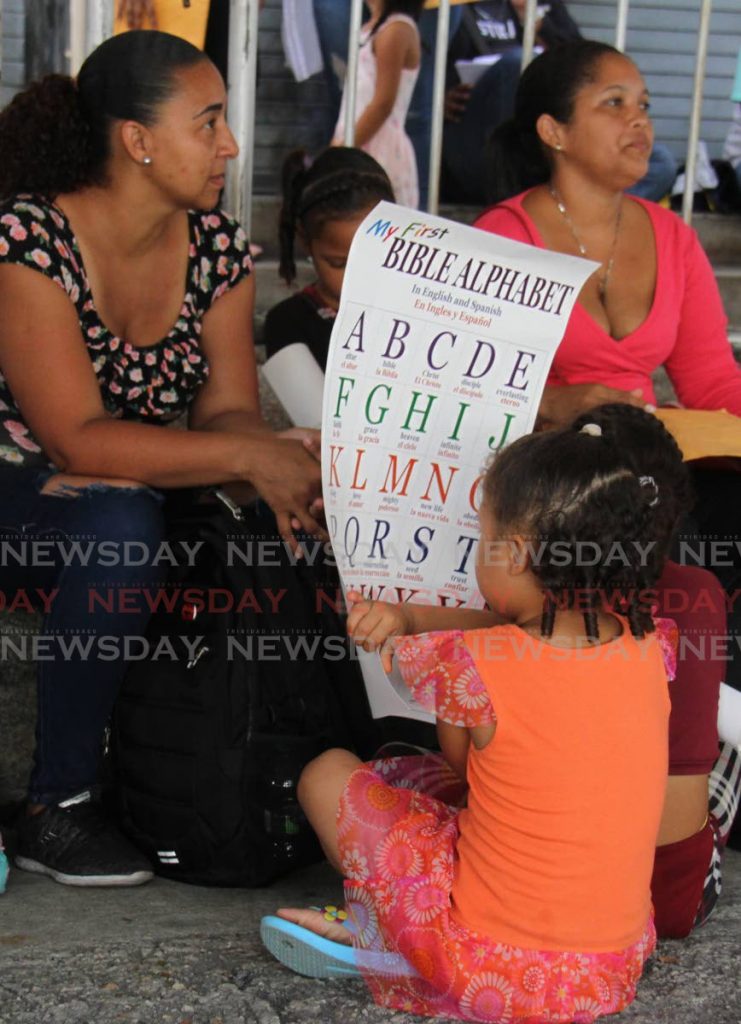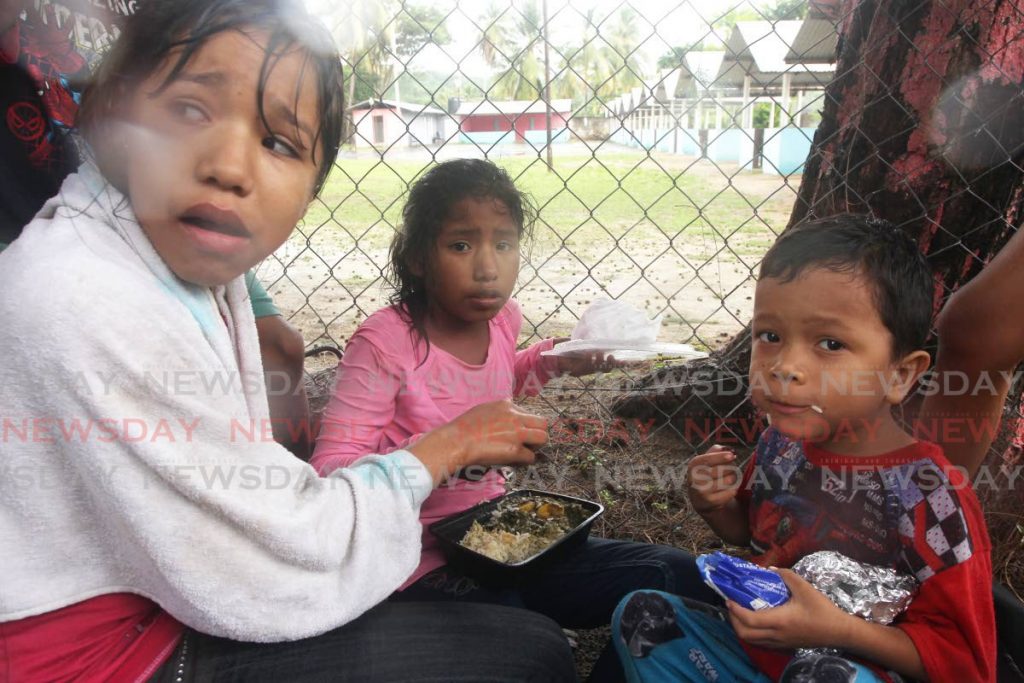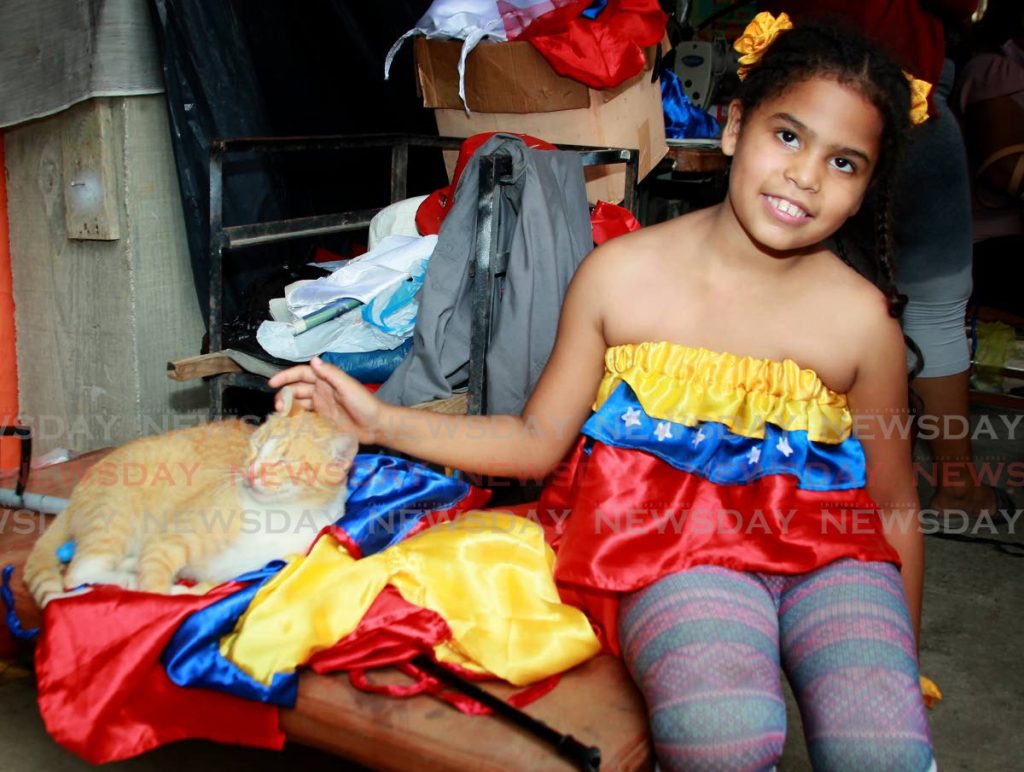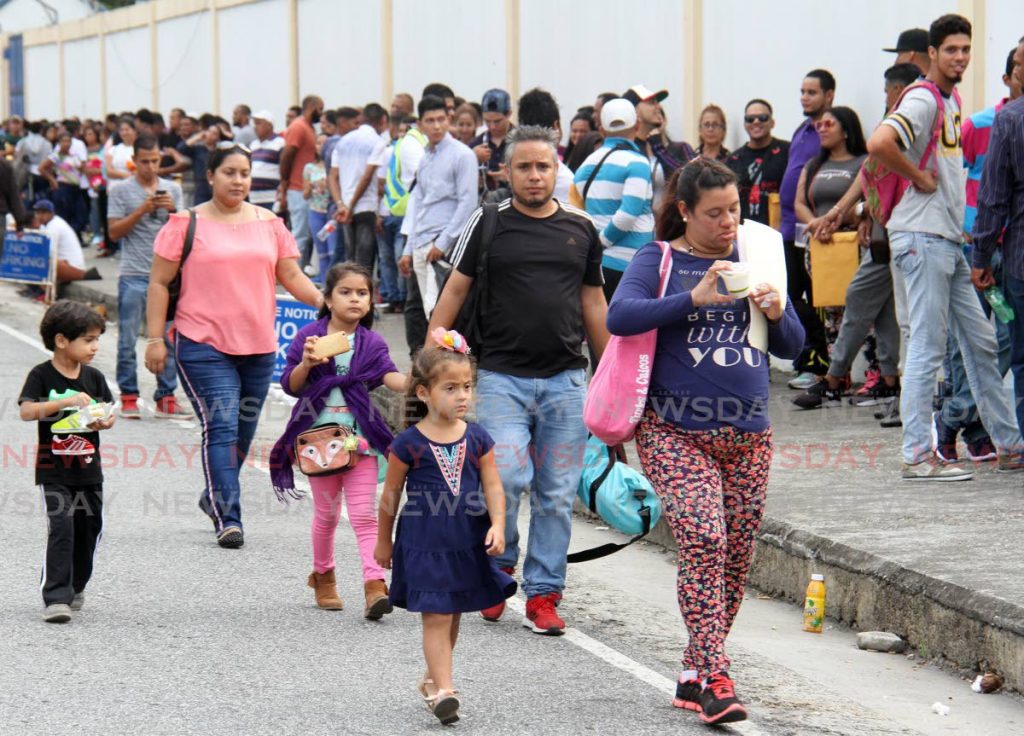An Equal Place to learn: 4,400 migrant children want to go to school

OF the 16,523 registered Venezuelans, at least 4,400 are children who are supposed to be in school.
The students instead are in a parallel education system awaiting approval from the National Security Ministry to allow them access to public schools. In the interim, 1,400 migrant students have enrolled in Equal Place, a parallel education system developed in 2019.
Equal Place uses online platforms NotesMaster and Daware to teach the children, preparing them to enter the school system. It is promoted through the Education Working Group (EWG), inclusive of UNICEF, UNHCR, Living Water Community (LWC), TTV Solidarity Network, Catholic Education Board of Management (CEBM), Archdiocesan Ministry for Migrants and Refugees (Office of the Archbishop), Pan-American Development Foundation (PADF) and the Ministry of Education.
For the past two years none of the migrant children have been able to access formal education in both private and public schools.
Chairman of the Association of Denominational Boards of Education Sharon Mangroo said in 2019, the government approached the organisation to help prepare migrant students to enter the school system.
“About two years, almost three years ago, the Prime Minister asked the Archbishop to take responsibility for educating migrant children. The Archbishop met with the then minister of education, and then minister of national security and they worked out a procedure for doing that. The bottom line is that the Ministry of National Security must give approval.”
When contacted for an update, National Security Minister Fitzgerald Hinds said: “This matter is not in front of me as Minister of National Security in any official way.”

Mangroo said the Catholic School Board has prepared at least 100 Venezuelan children for entry into primary school and are awaiting approval.
“The provision is that no local child must be negatively affected. No local child must be denied a place from the school. So what we do is that we identified primary schools, because we're not touching secondary school, that’s too controversial, in which there are school spaces.
"So we identified those and then we did the rest of the things that are necessary. We made sure that they were children whose parents held registration cards and they had sufficient English so that they would not disrupt the school.”
She added that teachers were also trained to teach English as a second language so that both students and teachers will be prepared.
Mangroo said it was even more difficult to have migrants enter secondary schools because of the demand among local children for places. She emphasised that none of the migrants are “in school” as that is illegal but are accessing some form of formal schooling.
“Every local child would like to gain entry into one of the secondary schools. So no, we didn't consider having the children there at all, not in the day school. We have made the premises available for after-school activities for those children.”
She said prior to the closure of schools, there were at least three schools that were made available to assist migrant children with after-school, secondary schooling.
UNHCR, in a statement to Sunday Newsday, reiterated that education is a fundamental human right, “regardless of who someone is or where they come from.”
“Being able to go to school gives children a chance to do more than just learn numeracy and literacy skills, but also key social and life skills. In addition to efforts supported by UNHCR, many organisations and entities have tried to provide means of informal educational engagement to children. However, these temporary interventions cannot replace being able to formally attend a school and engage in the holistic learning that the school environment allows.”
In January, UNICEF Child Friendly Space coordinator Matthew Batson said the primary school-aged migrant children followed the same subjects as those enrolled in accordance with the Ministry of Education guidelines, which include, mathematics, English, language arts, science, social studies and physical education.

UNHCR’s statement added: “Investing in strengthening the local education system, promoting inclusion and integration of refugees and migrants, and recognising international certificates and diplomas, rather than setting up parallel structures, can only be a benefit to the country’s overall education infrastructure.”
According to the UNHCR’s June report on Venezuelan migrants in the Caribbean, there are 1,235 students in the Equal Place programme with 1,022 attending regularly. The report added that 140 students were registered to join physical classes and were expected to begin in September but with schools not opening for all students, that plan was postponed. Sunday Newsday was told that no migrant child was granted a student permit allowing them to be enrolled in school.
In Guyana, 740 Venezuelan children ages five to 16 were enrolled in their public schools. UNHCR’s June report said Venezuelan children encounter challenges in accessing education throughout the Caribbean, mainly in non-Spanish speaking countries such as Aruba, Curacao, Guyana and TT.
The report stated: “Although Caribbean countries are bound by international legal obligations to provide education to all children, in practice, accessing formalised and accredited education remains a challenge.
Even in countries where official access is granted for public primary and secondary schooling, Venezuelan children and youth face administrative, financial, language and cultural barriers. Access to tertiary education and cases of xenophobia and bullying in schools remain challenging as well.”
The report said in Aruba and Curacao, migrant children have access to primary and secondary schools but are required to provide mandatory school insurance, with Aruba, requesting a “local guarantor.” In both islands, classes are taught in Dutch, Papiamento and English.
There are 46 refugees and asylum seekers in TT between the ages of 17 and 20 who were nominated to study university-level courses online, the report said. The programme is a collaborative effort between EdX, online education platform built by Harvard and MIT, and Hamad Bin Khalifa University (HBKU) in Qatar. Refugees and asylum seekers were also given vouchers to take online courses which may count towards the micro-bachelors and micro-masters’ degrees.
In the statement, UNHCR said it participated in and supported many education initiatives along with UNICEF, the Living Water Community and the Catholic Education Board, to help refugee, migrant and local children continue classes despite the challenges of remote learning. UNHCR said they have a good technical relationship with the Ministry of Education and stand ready to support the government with any technical or capacity building assistance including language training, translations, extra classrooms, equipment and furniture.

“Globally, UNHCR advocates for inclusion of refugee children in public education and other social protection systems. We hope that this can also happen in TT, similar to other Caribbean and Latin American countries, including Guyana, the Dominican Republic and Aruba. Education for all is imperative for the future."
Mangroo said they are ready and are patiently awaiting the approval from national security. In March, 13,800 Venezuelans applied to be re-registered after the 2019 registration expired. Those who do not re-register will be subject to deportation, like all illegal immigrants.
Mangroo added: “Guyana has 740 children in their public schools . I don’t know why we can’t get ours. We are all set we are ready to take them in, once we get approval but we cannot move because that is outside the law.”

Comments
"An Equal Place to learn: 4,400 migrant children want to go to school"